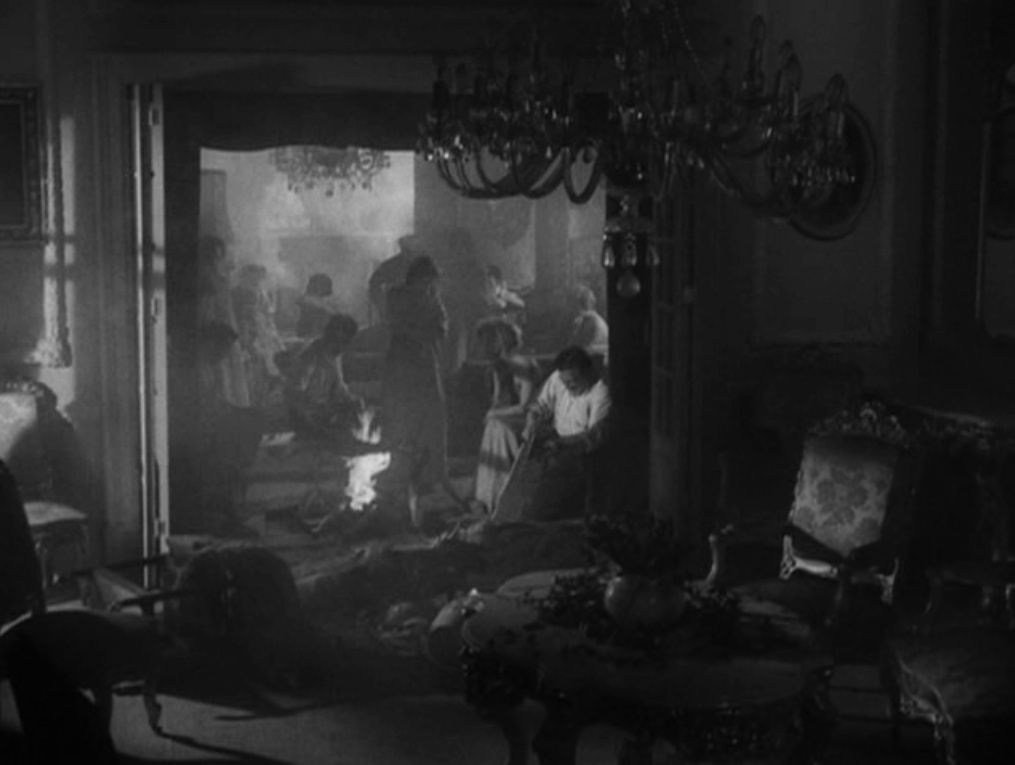The premise for Luis Buñuel’s THE EXTERMINATING ANGEL is that a group of socialites are unable to leave a parlor following a dinner party. This is about as much as I knew going into it, which was exciting, since the premise works better that way.
I figure that if you’re going to keep people in a room there’s a few ways it can go. The most obvious is that the room is literally locked or blocked off and those folks need to escape it physically. In this case that seemed unlikely, mostly because the movie is named The Exterminating Angel and that would be a pretty bad name for a movie about a locked room.
Another option is that it could be about some kind of supernatural force that the people need to overcome. My general hope was that The Exterminating Angel wouldn’t go this way. Arthouse films in the 60s didn’t tend to have great special effects budgets (I’m looking at you, Alphaville) and I felt that this film would easily get to a point where someone was doing some kind of terrible mime-in-a-box routine which I didn’t want to see.
What I was hoping for was that it would be a really really tight clockwork movie. A movie where every time someone wanted to leave some kind of accident or distraction occurred without making it obvious to the characters what was going on. I wanted the logic to be intricate and consistent. I wanted to finish watching it and feel like it was far smarter than me. (Essentially, I wanted Primer).
The Exterminating Angel isn’t that, of course. But it handles a great transition from literal to supernatural without delving into absurdities. It sells you on the premise and when you’re bought in, it freely explores the implications of the world it builds. In a way, it’s almost like an inverted Stalker (theme movie night idea: people trying to either get into or out of rooms). It’s a confident, entertaining and beautifully shot movie.

There’s a lot of good discussion about the meaning of the film. It’s either an allegory about the ruling class in Francoist Spain, a Ballardian apocalyptic society, a desert island story or the breakdown of Western civilization (this last link - an analysis by Marsha Kinder is excellent, very much worth a read).
Personally, the deepest meaning I saw was a criticism of rituals. Opera nights, dinner parties, kabbalah, defecation, sex, suicide, religion are all presented with an uncomfortable formality and basically lead nowhere. Even the means of escaping the room is a self-reflexive ritual which feels suspiciously like it didn’t actually work. Throughout the film, there are various visual tricks and repeated scenes which make me want to fall into a deeper ritual of analysis but I suspect that this too, is a trap and that ultimately very little of it makes a formal sense.
What really resonates with me is a completely unrelated quote from David Foster Wallace about watching Blue Velvet I came across the week after watching The Exterminating Angel. I think it applies equally as well here.
"Blue Velvet" is a type of surrealism -- it may have some -- it may have debts. There's a debt to Hitchcock somewhere. But it is an entirely new and original kind of surrealism. It no more comes out of a previous tradition or the post-modern thing. It is completely David Lynch. And I don't know how well you or your viewers would remember the film, but there are some very odd -- there's a moment when a guy named "the yellow man" is shot in an apartment and then Jeffrey, the main character, runs into the apartment and the guy's dead, but he's still standing there. And there's no explanation. You know, he's just standing there. And it is -- it's almost classically French -- Francophilistically surreal, and yet it seems absolutely true and absolutely appropriate.
And there was this -- I know I'm taking a long time to answer your question. There was this way in which I all of a sudden realized that the point of being post-modern or being avant garde or whatever wasn't to follow in a certain kind of tradition, that all that stuff is B.S. imposed by critics and camp followers afterwards, that what the really great artists do -- and it sounds very trite to say it out loud, but what the really great artists do is they're entirely themselves. They're entirely themselves. They've got their own vision, their own way of fracturing reality, and that if it's authentic and true, you will feel it in your nerve endings. And this is what "Blue Velvet" did for me.
Comments? If you have feedback, please share it with me on Twitter!